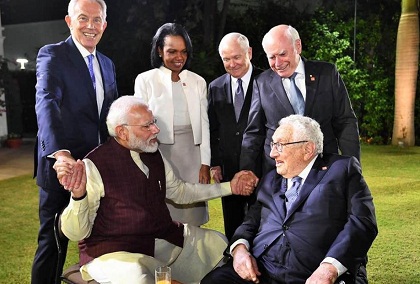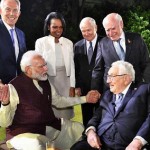Delhi’s business elite, strategic community and media corps, are usually blasé about the presence of celebrities in their midst. But the second annual meeting of the U.S.-India Strategic Partnership Forum at the ITC Maurya (on October 21) saw a record turnout, with two speakers, in particular, commanding attention: Dr. Condoleezza Rice, former U.S. secretary of state (2005-2009), and Dr. Henry Kissinger, 96, 66th secretary of state (1973-1977) and the National Security Advisor (NSA) from 1969 to 1975.
Dr Rice, the first African American woman to be secretary of state, who also served as NSA, spoke on the international situation, like the insider and respected academic that she is, to Bank of America Merrill Lynch’s Purna Saggurti.
Rice, a specialist on Russian affairs, was “disappointed” by Russia’s disruptive activities in East Europe, Syria and elsewhere, and interference in the U.S. elections. It had created instability, backed by military power and cyber capability. It was “a 19th century-economy”, whereas it needed to become a progressive, knowledge-based one.
As for China, the U.S. and the world had to cooperate in some areas (e.g. environment, energy and economic governance) and challenge it in others, such as the South China Sea issue. China should not be allowed “to outrun the U.S.” in frontier technologies and military modernisation.
When asked to comment on Lee Kuan Yew’s famous comment, ‘China has order, but no law; and India has law, but no order’, Rice said it was important to have law and democracy; with their help order could be built.
Rice, while noting that India-U.S. relations were better than before, acknowledged President George W. Bush’s immense contribution in this when he had said to her, “We have to do something about our relations with India.” Rice emphasised that the U.S.-India nuclear deal of 2008 was not just about nuclear energy; it paved the way for deeper collaboration in high technology, defence and economy.
What was her advice to Indian and American negotiators currently engaged in efforts to resolve bilateral trade issues? “Get a deal!” was her deadpan retort.
The afternoon session of the conference had an even bigger star. Dr Kissinger, 96, arrived in a wheelchair. Known for his diplomatic acumen and controversial role in several international crises (including Vietnam, Cambodia, Chile and Bangladesh), Kissinger shared the 1973 Nobel Peace prize with Le Duc Tho, North Vietnamese politician and diplomat (who had declined it).

In a fascinating conversation with John Chambers, head of the host institution, and Chairman (Emeritus), Cisco, Kissinger, when asked to explain his approach to negotiation, said he first studied the adversary’s needs and motivations well before proceeding to expound his concept of a mutually beneficial agreement.
He recalled his secret visit to Beijing in July 1971 when he had 48 hours in which to negotiate an agreement with Premier Zhou Enlai. Candid discussions helped build mutual trust, leading to the normalisation of U.S.-China relations, which changed the course of the Cold War.
With President Richard Nixon in the White House and Kissinger as his chief counsellor, India-U.S. relations reached a nadir as Washington displayed a blatantly adversarial attitude towards India. The U.S. Seventh Fleet was ordered to move to the Bay of Bengal in a veiled threat, and the Indian people and Prime Minister Indira Gandhi were reviled by the two worthies. Yet, India – with valuable support from the Soviet Union – prevailed over the powerful combine of the U.S., China and Pakistan, with Bangladesh emerging as an independent nation in December 1971.
At the Delhi forum, Kissinger conceded that the U.S. and India were pushed to “the edge of confrontation”, noting that they had come through the Bangladesh crisis “from the opposite point of view” but shared the conviction that the two could develop “a parallel approach”. Now, decades later, the two had crafted a consensus on key areas of security and the economy. Speaking last July at the same forum in Washington, Kissinger had noted that the two nations had “complementary interests”. “The beauty is that we don’t need to make an alignment because it is already there,” he added.
The standing ovation Kissinger received in Delhi on October 21 and the warm meeting he had with Prime Minister Narendra Modi indicated that India-U.S. relations are now in a new era in which past scars may have been forgiven, but not forgotten.
Rajiv Bhatia is Distinguished Fellow, Foreign Policy Studies Programme, Gateway House and a former ambassador.
This blog was exclusively written for Gateway House: Indian Council on Global Relations. You can read more exclusive content here.
For interview requests with the author, or for permission to republish, please contact outreach@gatewayhouse.in
© Copyright 2019 Gateway House: Indian Council on Global Relations. All rights reserved. Any unauthorized copying or reproduction is strictly prohibited.


